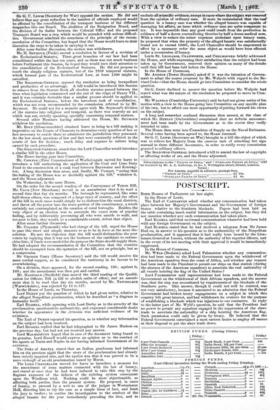POSTSCRIPT.
Bora Houses of Parliament sat last night.
In the House of Lords,
The Earl of CARNARVQN asked whether any communication had taken place between her Majesty's Government and the Government of foreign, States relative to the Southern blockade. Papers had been laid on the table containing much useful information on the subject, but they did not mention whether any such communication had taken place.
Earl RUSSELL said that no formal communication whatever had been held with any foreign Government on the subject.
Earl RussELL stated that he had received a telegram from Sir James Hud-on, in answer to his question as to the authenticity of the Neapolitan proclamation, and it appeared that it had really been issued by the Lieu- tenant-General at Lacers, without the authority of his superior officers, and in the event of its not meeting with their approval it would be immediately suppressed.
In the House of Commons,
Mr. WYLD (Bodmin) asked Lord Palmerston whether any communica- tion had been made to the Federal Government upon the withdrawal of the American squadron from the coast of Africa, and whether any request had been made to the President to permit our ships on that station (during the absence of the American squadron) to ascertain the real nationality of all vessels hoisting the flag of the United States ?
Lord PALMERSTON said representations had been made to the Federal Government on the withdrawal of their African squadron, and the answer was, that the step was necessitated by requirements of the blockade of the Southern ports. This answer, though it could not well be resisted, was not very satisfactory, because it amounted to an admission that the Federal Government had broken treaty engagements on a subject in which this- country felt great interest, and had withdrawn its cruisers for the purpose of establishing a blockade which was injurious to our commerce. In reply to the latter part of Mr. Wyld's question, he said that the President had no power to permit any squadron engaged in the suppression of the slave trade to ascertain the nationality of a ship hoisting the American flag. Such permission could only be given by treaty. He believed that the Federal Government entertained a most earnest desire to employ all means. at their disposal to put the slave trade down.






























 Previous page
Previous page